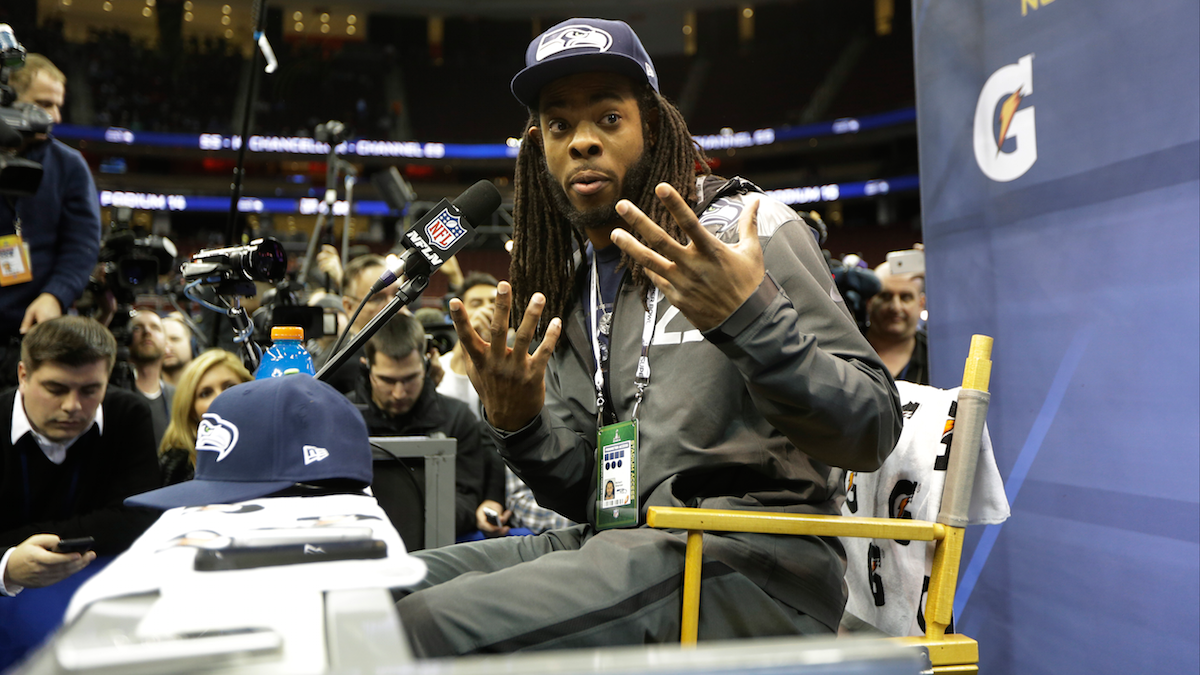Super Bowl brings super stereotypes

Seattle Seahawks' Richard Sherman answers a question during media day for the NFL Super Bowl XLVIII football game Tuesday in Newark, N.J. (AP Photo/Jeff Roberson)
On Sunday, America will stop to watch the Super Bowl, a premier sporting event featuring the Seattle Seahawks and the Denver Broncos. Traditionally, the stories that dominate in the weeks before the big game are focused on the teams’ strengths and weaknesses.
This year, however, another kind of story has dominated the airwaves. It is a story not of football, but of perceptions. And it has forced us to engage in an uncomfortable, but necessary debate about stereotypes.
The story began with what should have been a normal interview in the wake of the Seattle Seahawks’ victory over the San Francisco 49ers in the NFC Championship game. But when Stanford graduate and Seattle Seahawk Richard Sherman spoke on the sidelines after making the game-clinching play, the atmosphere quickly changed.
Post-game interview
Sherman, an African American, was loud and animated as he castigated his opponent, San Francisco 49ers wide receiver Michael Crabtree, as a “sorry” receiver who dared to question Sherman’s football skills.
Erin Andrews, a white female sideline reporter, held the microphone and quietly asked two questions, causing many to surmise that she was intimidated by the player’s outsized behavior. In the moments and days following Sherman’s adrenaline-driven rant, America responded angrily.
Sherman, a Stanford University graduate who is currently working on a master’s degree, was labeled a thug on social media. He was also called the N-word. He was taken to task for expressing himself so aggressively in the presence of a white woman.
And the stereotyping began
In reality, he was simply engaging in the self-aggrandizing trash talk that has become part of the culture in American professional athletics. Reality, though, didn’t matter, because Sherman’s behavior was viewed through the lens of stereotypes.
It was almost as if we’d been thrust back to the 19th century, when the image of black men terrorizing white women was used to justify lynching. Just as that image was false in the 1800s, it continues to be false today. Yet that image still informs the way in which much of America views black men.
Thankfully, Erin Andrews, the woman who conducted the interview, saw things differently.
“It wasn’t anything about, ‘He’s frightening me. He’s scaring me,’” Andrews said in published reports following Sherman’s outburst. “It was more about, ‘My follow-up question better be really good, because I know that this is going to go viral and this is going to be a big deal, and if I don’t ask the right thing, then I’m going to be crucified.’”
The response
In other words, Andrews viewed the incident through the lens of the moment, and not through the distorting prism of historical stereotypes. I believe her decision to stay in the moment was a good one. In fact, the rest of us should emulate that choice. But if we are to truly rid ourselves of the kind of kneejerk reactions that took place in the wake of the Sherman incident, I believe we must go further.
We must be brave enough to condemn historical stereotypes for the vicious lies they are.
We must be wise enough to view people as individuals, and not as caricatures.
We must be strong enough to form our own opinions rather than embracing the views of others.
We must be visionary enough to see racial bias as a solvable problem, and not a permanent condition.
This weekend, as we watch Richard Sherman play in the Super Bowl, let’s challenge ourselves to see him as a whole person, and not as a cardboard cutout.
Let’s see the Stanford graduate, the master’s candidate, the brash young man from Compton, Cal., the accomplished professional athlete and the flawed, yet generous man whose charity work opens doors for others.
And in the weeks that follow Sherman’s time in the spotlight, let’s learn the most valuable lesson this fiasco can teach us. Let’s learn to see each other as individuals and leave the stereotypes in the past where they belong.
WHYY is your source for fact-based, in-depth journalism and information. As a nonprofit organization, we rely on financial support from readers like you. Please give today.


